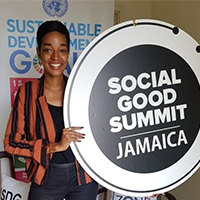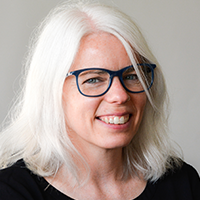Solving the Injustices Caused by Climate Change
A conversation with Jamaican youth climate activist Jhannel C. Tomlinson
"We have to ensure that we give a voice to people who are often considered voiceless in conversations about climate change and climate adaptation."
The reality of climate change is that it exacerbates injustices at both global and local levels. Extreme weather crises are happening more frequently and the costs of recovering from these events are skyrocketing beyond our means—all the while jeopardizing food and water security around the world.
Least-developed countries and Small Island Developing States have fewer resources available to handle these increasing risks and uncertainties, making it even more difficult to build resilient economies, ecosystems, and societies. Within these countries, some are more vulnerable than others to the impacts of climate change based on where they live, their social status, or the way they earn a living.
Furthermore, climate change is an intergenerational issue: future generations will either benefit or suffer from the choices we make today. Consequently, youth are rising up to demand action for the future of their planet—as was recently seen by the treaty presented at the end of Mock COP, an event organized by young climate activists to fill the spot of the postponed 26th United Nations Framework Convention on Climate Change Conference of the Parties (COP 26).
At the International Institute for Sustainable Development (IISD), we are working on a project to amplify youth voices on sustainability issues. This led to a conversation between our Senior Policy Advisor and Lead on Gender Equality, Angie Dazé, and Jhannel C. Tomlinson, a climate change activist whose voice is often heard when it comes to climate change issues in Jamaica. We were impressed to hear about the initiative she has taken in her community to address injustices related to gender inequality and rural living while pursuing a Ph.D. to further her career in community-based adaptation.
To follow along in the conversation and test your knowledge, try to get the following questions right!
Involving the big polluters
Angie Dazé, IISD (AD): What do you think when you hear those numbers?
Jhannel C. Tomlinson (JT): The disparity in greenhouse gas emissions just reiterates how important it is to have developed nations, those who are responsible for the majority of emissions, be part of the ongoing negotiations. As small islands, we need them to be partners in our adaptation and mitigation efforts, and we need them to understand that what they do impacts us on both short- and long-term scales. They need to invest in addressing the impacts of their actions—or inactions.
AD: What impacts of climate change are you observing in Jamaica?
JT: We are seeing different impacts across different sectors, but because I work closely with farmers, I’ll speak to those impacts first. The primary climate-related challenges that we see for our farmers are sporadic rainfall and drought, and then both of these couple together to create conditions where crops are more susceptible to disease and pests. In addition, we see increased prices for food. For example, when there’s a drought, the farmer has less to supply to the household, which means he has to increase the cost for his supply if he’s going to make a profit. The tourism sector is also affected because they have to pay more for food, which impacts overall consumption and profits. So we can’t look at different sectors in isolation—we need to take an integrated approach. And it is always the poorest people who suffer most from the impacts.
And it is always the poorest people who suffer most from the impacts.
Fighting for gender equality
JT: The biggest challenge for women, and why I think they are most vulnerable, is that they are the ones who have split themselves across so many different activities—in the home, on the farm, etc.—and as a result, they aren’t able to really take advantage of many opportunities. Another thing that puts women at a disadvantage is that usually the male relatives are the ones who are given the preference of which land they want and how they want to use it. Women are only given the opportunity after the male family members have made their decisions first.
AD: Those issues ring true with what we’re seeing in a number of the countries where we have been analyzing the gender considerations for adaptation. What do you think can be done to overcome some of those barriers and ensure that everyone has the same opportunities to protect themselves and their families from the impacts of climate change?
JT: A solution that I’m actively helping with is trying to have women as champions or leaders in their communities. In my current research, one thing I’ve seen was that the women-led groups tend to have higher potential to adapt than those that are run by men. They develop stronger connections with external partners, they are more likely to go out and seek funding, and they are more likely to inquire about different things. So, in giving women opportunities and empowering them, we’re creating this space for other leaders and champions as well.
In my current research, one thing I’ve seen was that the women-led groups tend to have higher potential to adapt than those that are run by men.
A coffee crisis
JT: Coffee is the primary crop grown in Jamaica’s eastern parishes, specifically in the Blue Mountain region. However, with the effects of climate change, such as experiencing drought shortly after a hurricane, these plants become even more stressed, which proliferates coffee leaf rust disease. This disease is one of the biggest challenges for our coffee sector.
AD: What kind of solutions have you been a part of that address these challenges in the coffee sector? Have you found a way to ensure these solutions are equally accessible to both the men and women who need them?
JT: One of the most promising practices I’ve seen to help farmers adapt their agriculture practices to these climate conditions is the Farmer Field School Approach. It’s a space where farmers can share experiences and Indigenous Knowledge while experts demonstrate new climate-smart techniques. We’ve also coupled these opportunities with Women Coffee Growing Groups, while trying to ensure that the meetings and trainings are organized at times that work for women within their busy schedules. This gives women a safe space to share their ideas and experiences and offers opportunities to hear from experts that they might not be able to access on an individual basis.
This disease is one of the biggest challenges for our coffee sector.
What will you do?
AD: When you think about all the work that you’ve done with women, farmers, and youth, and the experiences that you’ve had both internationally and in Jamaica, what makes you feel hopeful about the future?
JT: What makes me feel hopeful is the fact that young people are passionate and poised. I am actively a part of at least four different youth groups, three of which are led by young women, and all do amazing work. And I think they are, in fact, ready to advocate for our collective future. Youth are pushing; we are recognizing that we have to be the ones to take command of this because we are fighting for our future.
Youth are pushing; we are recognizing that we have to be the ones to take command of this because we are fighting for our future.
This has been a conversation with...

Jhannel C. Tomlinson is a Jamaican climate change activist and PhD candidate at the University of the West Indies, Mona. She is particularly passionate about climate youth engagement, and her research focuses on agriculture, rural livelihoods, and community-based adaptation. She is currently the Sustainability Initiative Lead and Board Secretary for the International Women’s Coffee Alliance, Jamaica, and the Caribbean Advisor on the Next Generation Climate Board at the Global Greengrants Fund. Some of her achievements include being the recipient of the Jamaican Prime Minister’s Youth Award for Environmental Protection, as well as being a United Nations Youth Delegate to COP24, the Youth Action Summit, and the Climate Summit.

Angie Dazé has been working with IISD’s Resilience team since 2014. Her work focuses on policy and practice related to climate change adaptation, resilience, and gender equality. This includes analysis, guidance, and technical support for National Adaptation Plan (NAP) processes through the NAP Global Network. In addition, she leads research projects exploring the gender dimensions of climate change adaptation in different contexts.
You might also be interested in
A Fair Path Forward: What gender-responsive adaptation teaches us about an equitable recovery
Only with an understanding of who is most vulnerable—and why—can we identify strategies that address real needs, ensuring no one is left behind.
Learning from Experience: How an African parliamentarians' network is looking to mainstream gender considerations into agriculture
The challenges to women’s participation in agricultural production and economic opportunities are often deeply nuanced and specific to their regional, national and local contexts. This is the first part of a series covering ECOWAS network meetings on gender considerations in agriculture.
Advancing Gender-Responsive Climate Action Through National Adaptation Plan (NAP) Processes
This report aims to help countries engaged in NAP processes use a gender-responsive approach, regardless of where they are in the process.
Toolkit for a Gender-Responsive Process to Formulate and Implement National Adaptation Plans (NAPs)
This toolkit is designed to support country efforts to pursue a gender-responsive national adaptation plan (NAP) process.





